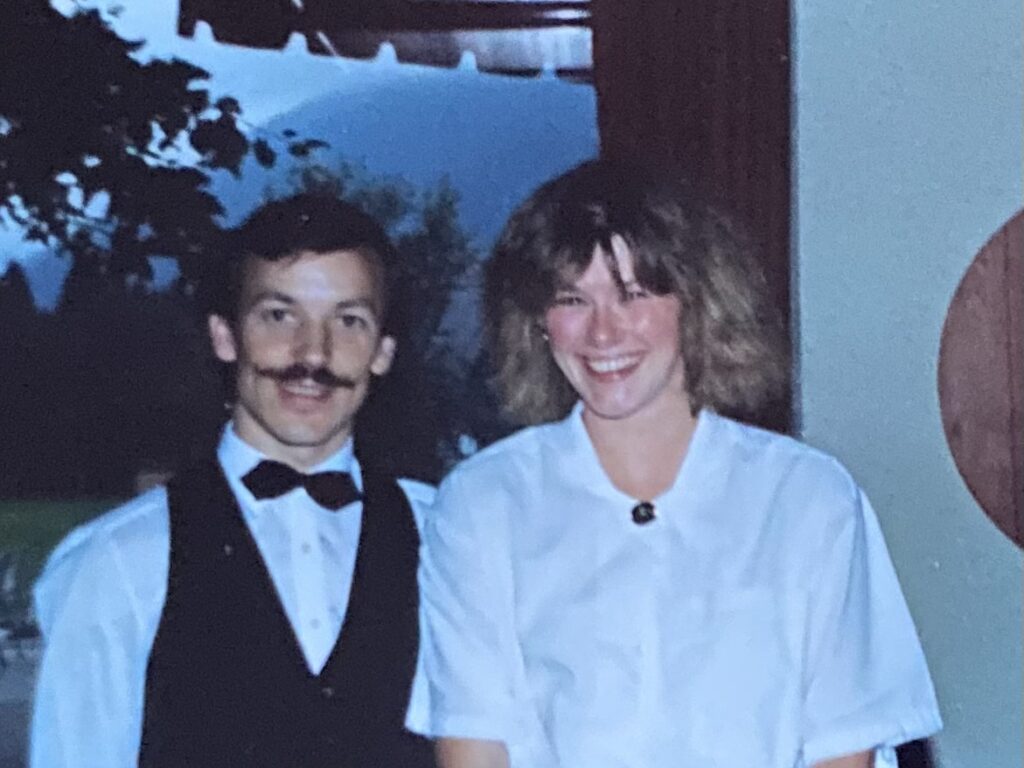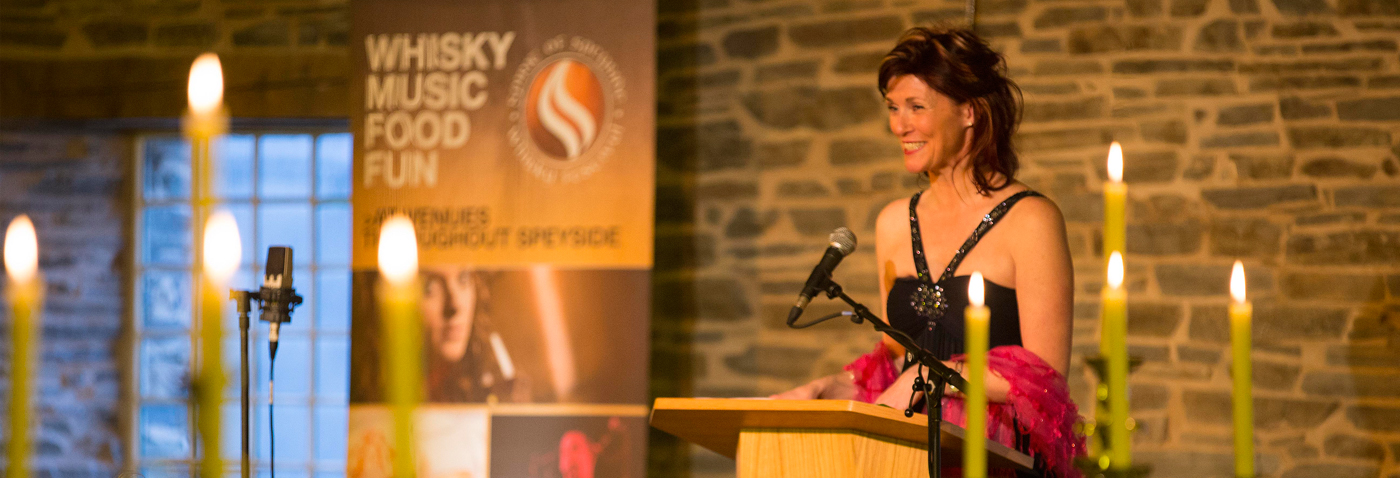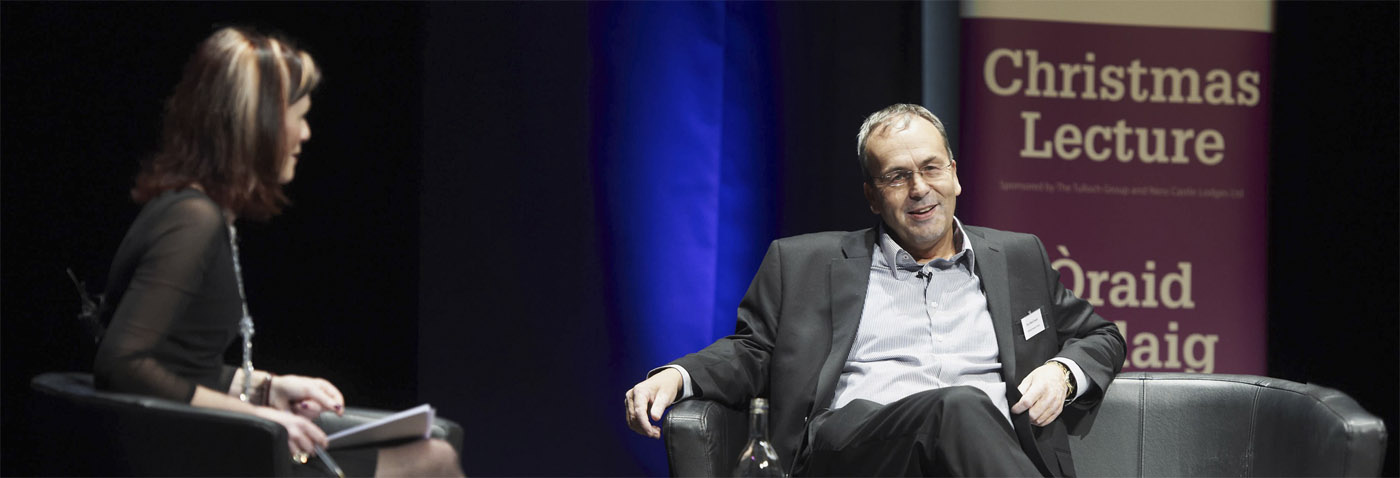As a student I worked in restaurants – we all did, didn’t we? I waitressed and washed up, juggled copious frying pans on early breakfast shifts, spent years baking scones, cakes and traybakes, and learning how to coax a mighty fine cappuccino from a cantankerous steaming hulk of a coffee machine. Working in restaurants, hotels, and cafes was busy, frantic, and fun.
We didn’t call it hospitality in the late 80s, but those years in the industry gave me cash in my pocket, friends for life, and a work ethic that has never left me. They helped me properly understand teamwork; that deeply satisfying feeling of being a small but vital cog in a well-oiled machine.
It also means I take a very dim view of people who are rude to those who work in hospitality. Sure, complain if there’s a problem, but don’t be a dick.
Working abroad

Working in Davos in the 80s. Mario’s moustache was almost as striking as my Bananarama inspired perm. Apologies for both…
Hospitality took me abroad too. I worked for a couple of seasons in Davos, Switzerland after university. Still frantic, still fun, this was a wildly different experience. I was the only member of staff without a formal qualification in service, and had to rely on my wits, that work ethic, and the support of my French, Portuguese, and Swiss colleagues while they taught me the skills of their trade.
I doubt I could still confidently fillet a baked trout in front of guests, nor can I remember which wine glasses to use for a Fleurie, but I came home from Switzerland with some startlingly niche additions to my German vocabulary, and a feeling that they did things properly over there. A career in service was a career to be proud of.
Aiming higher – or was I?
Hospitality was never going to be my career. I was aiming (foolishly?) for a future as a lawyer. Waitressing was how I funded my way to what I imagined was something better. And that’s how too many of us erroneously regard the industry. We look on it as stopgap work till something better comes along, not realising its value.
We ignore the tremendous benefits a career in hospitality can bring, and we take for granted those who work long hours for what is often poor pay.
Closures, closures, closures…
Last weekend, Badenoch’s Bar in Elgin closed its doors for the last time, citing impossible financial pressure. The wonderful, award-winning Falls of Shin visitor centre lies empty, because the Kyle of Sutherland Development Trust have been unable to find a tenant who can secure staff. These are just two of scores of places we have already lost, and there will doubtless be more casualties this winter.
There is some good news. Utopia Café in Inverness have recently reopened after a lengthy closure; but that reversal in fortunes is rare. More often than not, pubs and cafes are closing their doors, if not for good, then for a few days every week. Add in spiralling food and fuel costs and you wonder how many of them manage to survive.
Attitude change required
According to a recent study, more staff are leaving hospitality now that ant any time since the start of the pandemic.
If we are going to help raise our Scottish hospitality industry out of its current crisis, we need to change our societal attitude to the way we think about it. We need to be promoting hospitality as a valuable, sustainable career option, one that can not only reward with immense satisfaction, but can give a good living too.
Those that are surviving, and who are retaining staff, only do so because they are investing in their people. They are bringing in (mainly) young people and offering them the kinds of experiences I had as a student; making them feel valued and part of a team, investing in their training and wellbeing, and – as far as they can make the sums add up – in their salaries.
What would you do – permits for foreign staff?
At a recent round-table lunch in Inverness I asked the guests what each would do to help their industry, if given the keys to Downing Street. The plea from hospitality was impassioned. It needs to be made as easy as it was pre-Brexit to recruit from abroad; even six-month work permits would help.
But we can’t just rely on those from abroad. With Suella Braverman’s outrageous stance on immigration, that’s looking increasingly unlikely to happen.
We must wake up to the valuable opportunities a career in hospitality can bring to our own young people, and we need to value the skill, passion, and tenacity of those who dedicate their lives to the industry. Otherwise, we may face a future without the pubs, cafes, restaurants, and hotels that bring us such richness and joy. Unthinkable.
This column is published by Highland News and Media in newspapers across the north of Scotland. If you can, please support print media and the future of independent journalism by buying a paper, or subscribing online.
If you’d like to receive it by email every week, sign up free. Just pop your email address into the widget on my home page here. And feel free to share!



